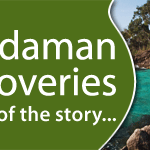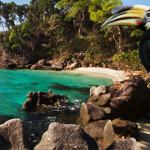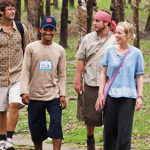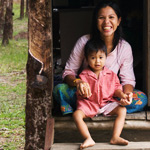Andaman Discoveries Blog
Friday, April 30, 2010
Red Shirt Update
The Red Shirt protests in Bangkok have filled Kuraburi residents with remorse for the Thai people that are caught up in the struggle. There has been no sign of violence or discord in our calm town, only concern for the seemingly senseless fighting so far away in Bangkok. But the general feeling is that of hope. Hope that the protesters will stop fighting and start loving each other again. Hope that there will be a just and kind end to the turbulence.
This same hope ripples down from parents to their children. During interviews for the Youth Scholarship Program at Andaman Discoveries, children between the ages of 9 and 17 were asked what they would change if they were given the chance. If they could only choose one thing in the world it would be to stop the fighting. These are children that worry about survival, working to help bring in money for the family. On their school holiday, many of them went fishing with their parents to increase their harvest. A simple request from the children stop fighting and love each other again.
And life carries on in spite of the political upheaval in Bangkok. The holiday season in Kuraburi has been much the same this year. Locals and visitors celebrated Songkran as usual. Children played in the streets, throwing water and laughing hysterically. Motorists avoided wet sidewalks in case gangs of giggling kids awaited, water guns in hand. And guests continue to bustle through Kuraburi, celebrating Coronation Day, Visakha Bucha, and Labor Day.
We hope these first-hand accounts serve as a reminder that the North Andaman Coast is far from Bangkok. We strive to serve the peaceful and hard-working communities in which we work, and can only hope that the ill effects of political turmoil do not disrupt our efforts.
Our work at Andaman Discoveries connects responsible tourists with responsible development. Homestays, handicraft cooperatives, and ecotourism are concrete ways that Thai people can work to alleviate poverty and preserve cultural heritage. By supporting Andaman Discoveries, visitors are traveling responsibly and supporting a sustainable way of traditional life. For more information about the work we do in local communities, please visit http://www.andamandiscoveries.com/community-development-projects.php.
Wednesday, April 7, 2010
Asia's Responsible Tourism Award: Andaman Discoveries
Recently, we were chosen as nominee for the Asia's Responsible Tourism Award. If you can, please take 30 seconds to vote for us at their website, so we can keep up the good work!
The website is

Our connection to the villages comes from rebuilding our lives together, and our projects focus on the big picture, empowering people to define their own future. This means that, along with responsible tourism, we also support scholarships for 120 kids, reforestation, a community development network, and a lot more. Pardon the spiel if you've already heard it, but it's the real deal.
Winning the Asia's Responsible Tourism Award would mean a lot: the award will underwrite our projects, and the publicity will help us spread our message, which is always a challenge with a miniscule PR budget :) If you are excited by all this, feel free to post this message on your facebook account, blog, or email lists.

With thousands of nominations annually, the Asia's Responsible Tourism Award recognizes innovative business projects that increase investment into the local community and take a responsible approach to the environment in which they are operating.
So, if you could be so kind as to follow the link and vote for us, it would be of great service to our projects and the people they serve.
Andaman Discoveries' team
Labels: Asia's Responsible Tourism Award, community development
Tourism and Poverty Reduction
By Claudine Nagiah
Tourism is one of the world's largest and fastest growing industries. Tourist spending in developing countries is almost three times greater than the amount of international development assistance. The potential of tourism industry to contribute towards poverty reduction is enormous.
Andaman Discoveries recently attended the launch of a new book on tourism and poverty reduction, written by Jonathon Mitchell and Caroline Ashley from the Overseas Development Institute in London. The book looks at the different ways that money from tourism impacts the local economy and local people in developing countries, and identifies three main pathways that tourism spending flows to poor people:
1. Direct effects, such as employment;
2. Indirect effects, such as the growth of construction and retail sectors, and increased demand for agricultural products;
3. Dynamic effects, such as improved infrastructure in the country, and a greater tax base to fund social welfare and education.
The authors found that between 5–25% of tourist spending makes its way to poor people, so the potential for tourism to make a positive impact on the lives of poor people is huge.
Unfortunately, where tourism it is poorly regulated, the results can be disastrous. Insensitive tourism development can have negative impacts on local environment and wildlife. It can contribute to the loss of cultural heritage and traditional livelihoods, and result in the displacement and exploitation of local people. More needs to be done, particularly in the mainstream tourism sector, to reduce these negative impacts and ensure that tourism really does bring positive benefits for poor people.
Here at Andaman Discoveries, we have done our own analysis of how tourism funds are spent. In 2009, 17% of the income from tourism went directly to communities and local partners for the provision of tourism services
 volunteer placements. An additional 16% went to locally owned businesses for provision of services such as transportation and accommodation. That’s a total of 33% of tourism spending, going directly to local people in the region. In addition, a further 44% went towards community projects that provide benefit to local communities, such as scholarships, conservation, tree planting, and vocational training.
volunteer placements. An additional 16% went to locally owned businesses for provision of services such as transportation and accommodation. That’s a total of 33% of tourism spending, going directly to local people in the region. In addition, a further 44% went towards community projects that provide benefit to local communities, such as scholarships, conservation, tree planting, and vocational training.Community based tourism (CBT) in the North Andaman region has been particularly successful as a socio-economic strategy to help communities recover from the impact of the Asian tsunami in 2004. It provides people with a sustainable form of income within their own village, after their homes, fishing boats and farms were destroyed. The emphasis on homestays and handicraft projects is particularly helpful for women, as it gives them a viable way to support their family and increases their standing within the community. People have less need to relocate to major cities and tourist destinations to make a living, which helps to keep the village and its cultural traditions alive.
The positive benefits of CBT can reach far beyond financial impacts. When managed effectively, CBT puts the villagers in control of their own destination; the villagers make the decisions about how tourism in their village will be managed and so can work together to ensure their lands, their cultural heritage and natural environment are protected. The very fact that tourists come to visit their village instills them with a deep sense of pride and a determination to preserve their culture and environment for future generations.
Income generated by Andaman Discoveries’ tours support a number of conservation projects in the area. Funds from tourism help to finance environmental projects such as recycling and solid waste management, whilst the tourists and volunteers are able to directly support projects such as mangrove rehabilitation and conservation of rare species of water lilies and orchids. The children in the villages, schools and orphanages we work with benefit enormously from the time and attention which our guests and volunteers so generously give; it helps to improve their English skills, gives them exposure to different nationalities, cultures and values, and above all brings them lots of fun and laughter.
So, from us all here at Andaman Discoveries, we would like to say a big “thank you” to all of our guests, volunteers and supporters. It is because of your support and kindness that we are able to continue making a positive impact in the lives of the communities we work with.
Labels: Andaman Discoveries, community tourism, community-based tourism
Monday, April 5, 2010
Nai Tui Hike for Community Project Site Visit
by Jenny Lovell
Bodhi, Laura, and I took a walk at Nai Tui, a small outdoor recreation area near Kuraburi. There is a small community group that works together to preserve the watershed and encourage conservation and appreciation of the area.
They took us on a hike up the streambed, where we saw freshwater crabs and shrimp. It was beautiful and cool in the shade of the trees. They told us that there is a natural water hole at the source of the spring water for the river, which is used by wildlife in the surrounding area.
Our guides showed us the freshwater shrimp and crabs, which the locals catch as a source of food and saleable goods. Searching through fallen leaves and under the edge of rocks, they could find a surprising number of these little guys.
We hope to coordinate overnight backpacking trips with this community group. In the next few weeks me and a couple of other interns will go on a pilot trip with the guides, staying overnight in the jungle near an ancient Buddhist temple on a nearby mountain.
There is also an improvement project that we hope to lend funding and volunteers to help complete. They have already built benches at the waterfall near the trail head, but now they want to complete a restroom and functional day trip area. One of the great things about working with community-based tourism is helping to support the locals in encouraging appreciation for these unknown nooks of ecological goodness.
Labels: community, jungle hike
Subscribe to Comments [Atom]






